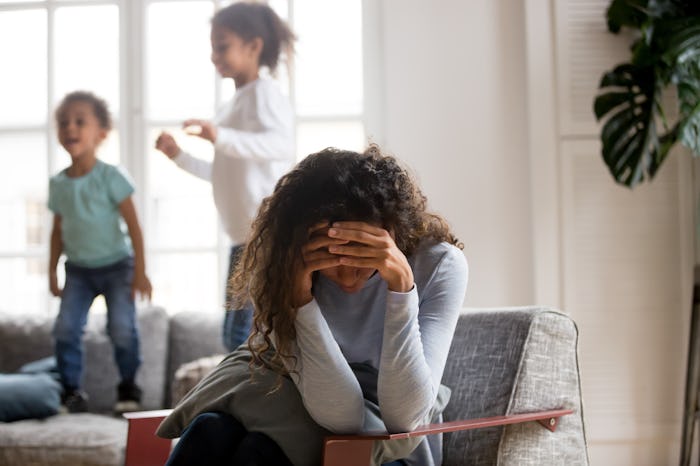Life

Yes, Parental Burnout Is Real & Its Impact On Families Can Be Devastating
A certain degree of mental and physical exhaustion is par for the course when you're bringing up little people. But sometimes the stress of parenting goes a bit further, leading to what is known as "parental burnout," and can have a lasting impact on families when not addressed. Some recent research found that chronic stress and burnout can lead to parents feeling detached from their children and unsure of their parenting abilities, as Science Daily reported. Additionally, researchers found that these mental and emotional implications of burnout can potentially lead to neglect and child abuse — making clear the need to prevent burnout in the first place.
Psychology Today defines parental burnout as a "unique and context-specific syndrome resulting from enduring exposure to chronic parenting stress." In order to gain more insight into the effects of this syndrome, three separate studies examined how parents felt and behaved over time. All three involved parents completing online surveys about parental wellbeing and exhaustion, Science Daily reported.
More than 2,000 parents participated in the first study, answering questions about emotional exhaustion, emotional distancing, and feelings of inefficacy; thoughts about escaping their family; the degree to which they neglected their children's physical, educational and emotional needs; and their tendency to engage in verbal, physical, or psychological violence, according to the Association for Psychological Science. The number of participants dwindled for the subsequent studies, but enough information was gathered to form some important takeaways.
Overall, researchers determined that parental burnout and parental neglect were a vicious cycle. Basically, parental burnout led to parental neglect, which in turn led to parents feeling burnt out, as Baby Gaga reported. From there, parental violence also occurred due to burnout.
A separate study, conducted in 2017 and published in the journal Frontiers in Psychology, found that something between 2 and 12 percent of parents suffer from parental burnout. With the issue being widespread and its effects lasting, what can parents do to avoid experiencing it themselves? According to Scary Mommy, there are steps you can take.
First, ask for help when you need it and have people in your life that you can go to for that help. The quickest way to exhaustion is trying to do it all yourself. Next, lower your bar of expectations. Perfection isn't attainable in any area, much less parenting. Lastly, maintain an identity outside of your parental role and make time for yourself. Yes, I know that's often easier said than done — I have a toddler, myself, and hours of "me time" are few and far between — but it is so, so important.
Lead researcher for the recent studies, Moïra Mikolajczak of UCLouvain, seems to agree. "Parents need to know that self-care is good for the child and that when they feel severely exhausted, they should seek help," said lead researcher for the studies, Moïra Mikolajczak of UCLouvain, Mikolajczak said, according to Healthy Mummy. She went on to explain how experts can intervene:
Health and child services professionals need to be informed about parental burnout so that they can accurately diagnose it and provide parents with the most appropriate care. And those engaged in policy and public health need to help raise awareness and lift the taboo on parental burnout, which will encourage parents to seek the help they need.
While I highly doubt the moms and dads of the world need to be told that they can get burnout on raising their kids, the implications of parental burnout underline the importance of combatting stress and exhaustion. If you are feeling overwhelmed in your life as a parent, reach out — you can't pour from an empty cup.
This article was originally published on